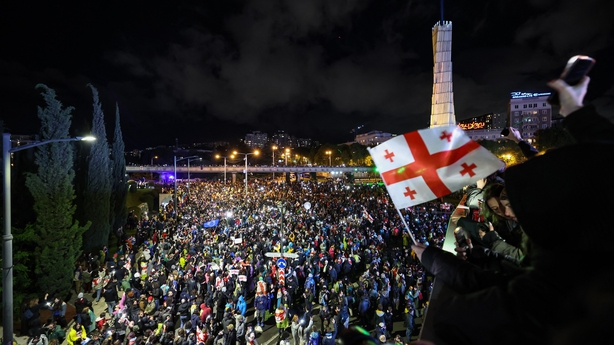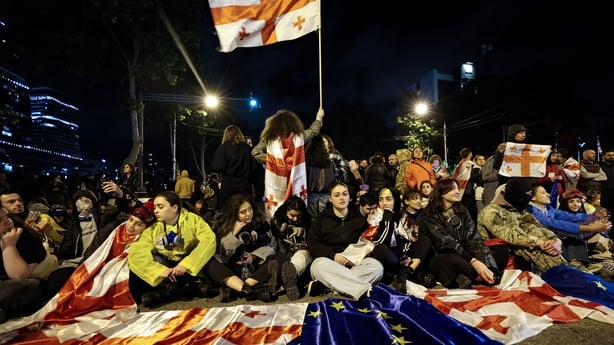Georgia faced a blizzard of international condemnation as the EU, NATO and UN criticised the adoption of a controversial "foreign influence" law targeting overseas-funded organisations.
Ruling party politicians voted through the legislation yesterday in defiance of protesters worried the Caucasus country is shifting away from its pro-Western course towards Russia.
The move was divisive in the ex-Soviet republic, where according to opinion polls most of the population wants to join the European Union and NATO, and is staunchly anti-Russia.
"The adoption of this law negatively impacts Georgia's progress on the EU path," EU foreign policy chief Josep Borrell said in a joint statement with the European Commission.
"We urge the Georgian authorities to withdraw the law."

The EU statement reiterated condemnation for "intimidation, threats and physical assaults on civil society representatives, political leaders and journalists" during demonstrations against the law.
A spokeswoman for the NATO military alliance said the law was a "step in the wrong direction... away from European and Euro-Atlantic integration".
"We urge Georgia to change course and respect the right to peaceful protest," said NATO spokeswoman Farah Dakhlallah.
UN human rights chief Volker Türk said in a statement he "deeply regrets" Georgia's adoption of the law.
"Authorities and lawmakers have chosen to disregard the many warnings by human rights defenders and civil society organisations," Mr Türk said.
"The impacts on the rights to freedom of expression and association in Georgia unfortunately now risk being significant."
'Kremlin-style law'
The flurry of criticism came after the United States yesterday warned that the "Kremlin-style" law would hit the US' ties with Georgia if it was not withdrawn.
Georgian president Salome Zurabishvili, who is at loggerheads with the government, has vowed to veto the law, though the ruling Georgian Dream party has enough politicians in parliament to override her veto.
The bill requires NGOs and media outlets that receive more than 20% of their funding from abroad to register as bodies "pursuing the interests of a foreign power".

Critics have said it mirrors repressive Russian legislation used to silence dissent, in a symbol of the ex-Soviet republic's drift closer to Russia's orbit in recent years.
Protests have sprung up against it, and scuffles have even broken out inside parliament between opposition politicians and members of the Georgian Dream party.
Georgian Dream has sought to depict the protesters as violent mobs. It insists it is committed to joining the EU, and portrays the bill as aimed at increasing transparency of NGO funding.
Turkish law proposes to criminalise research for 'foreign interests'
Meanwhile, draft legislation in Turkey proposes to jail journalists and researchers working for foreign "interests", following similar measures in Russia and Georgia that rights groups branded repressive.
The proposed amendment to Turkey's penal code allows for jail terms of three to seven years for those convicted, according to the text, obtained by AFP.
It applies to "anyone who carries out or orders research on (Turkish) citizens and institutions with the aim of acting against the security or the political, internal or external interests of the state, on the orders or in the strategic interests of a foreign organisation or state".
The far-right MHP party's vice-president Feti Yildiz said in a message on X that it would cover areas such as "economy, finance, the army, national defence, public health, public security, public order, technology, culture, transport, communication, cyberspace, critical infrastructure and energy".
The MHP is allied with the governing AKP party of President Recep Tayyip Erdogan, whose authoritarian stance has been criticised by rights groups.
Emre Kongar, a writer and contributor to daily newspaper Cumhuriyet, branded the new proposal a "witch hunt" in a message on X.
Media rights watchdog Reporters Without Borders (RSF) warned that the text did not appear to contain "guard rails to prevent judicial abuses".
The bill "threatens with imprisonment any journalist working for a media organisation that depends on international funds," RSF Turkey representative Erol Onderoglu wrote.
"Erdogan's government continues to undermine freedom of expression and the press," RSF added in a statement.
"The all-encompassing incrimination of agents of influence risks further weakening the practice of free, diverse and independent journalism in Turkey."

